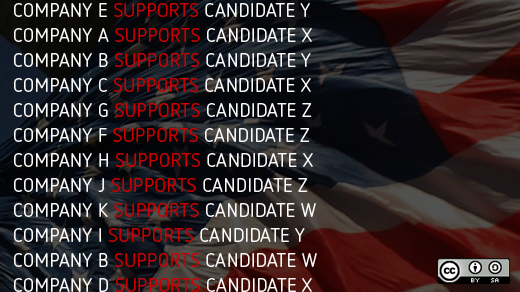Two years ago, I interviewed law professor, author, and Creative Commons co-founder Larry Lessig to discuss his work on institutional corruption and what he describes as the "economy of influence" in American politics. This week he was back in Durham, NC to discuss his new book, Republic, Lost: How Money Corrupts Congress—and a Plan to Stop It.
Nearly 100 people crammed into the basement of the matchbox-sized Regulator bookshop to hear Lessig read from his latest work and take questions about how to change the way money influences elections. The basic problem, he said, can be summed up with four numbers:
- 0.26% of Americans give more than $200 in a congressional election;
- 0.05% max out;
- 0.01% give more than $10,000;
- .000063% — 196 Americans — have given more than 80% of the superPAC money spent so far in this election.
It's easy to see that a tiny number of people have an enormous influence on our elections. "This will never get fixed until we fundamentally change the way we fund the political system." Lessig warns. However, "Nobody inside the beltway of Washington wants the system to change."
Some argue that Citizens United, in which the Supreme Court held the longstanding ban on corporate expenditures in federal campaigns to be unconstitutional, is to blame for the current state of ‘big money' influence in politics. According to Lessig, however, the problem existed well before the Supreme Court's decision. "Citizens United might have shot the body, but the body was already cold," he quips.
I won't go specifically into his plan for campaign finance reform. It's outlined in the book, and he wrote an excellent summary. What I found most interesting during his talk was his candor about how the political system currently works, including heavy criticism of the Administration for failing to introduce a single bill that would limit campaign contributions and the disillusionment that many voters felt at not seeing the changes in Washington that they had expected.
Lessig concludes that the office of the President cannot alter the current economy of influence. Rather, the single most important step, he argues, is to create a "genuine, cross-partisan movement of citizen politicians," not necessarily legislators, who demand the change at all levels of government. He advocates that all citizens take the anti-corruption pledge available at Rootstrikers (formerly Change Congress).
The odds are stacked against him. He concedes that no politician can "just agree to take small donations only, because they'll never get elected under the current system." But, he says, "When talking about the meaning of love, whether it's your family or your country, the odds aren't relevant."







6 Comments